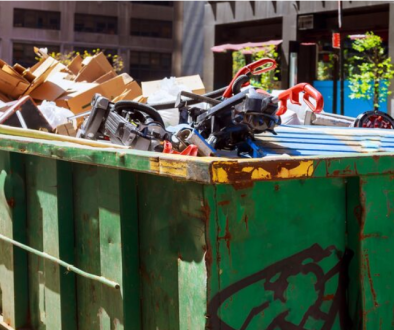Whether residential, commercial, or infrastructural, construction projects inevitably result in waste generation, posing challenges to waste management, environmental sustainability, and regulatory compliance. Proper waste management at construction sites is essential to ensuring the smooth execution of the project, cost efficiency, and adherence to environmental regulations. As a family-run skip hire and aggregate company servicing Staffordshire, we are dedicated to providing effective waste management solutions for construction projects and promoting environmentally responsible practices within the building and construction sector.
In this comprehensive guide, we will delve into the essentials of effective construction site waste management, emphasising the vital role of skip hire, waste disposal, and recycling strategies. We will provide actionable tips for implementing waste reduction, segregation, material reuse, and regulatory compliance within your construction project. Furthermore, we will highlight the importance of collaborating with a reliable and experienced skip hire company, ensuring that your waste management processes align with industry best practices, sustainable values, and regulatory requirements.
Whether you are an experienced construction professional or undertaking a small-scale building project, this guide aims to provide valuable insights and resources for effective waste management, enabling you to design and execute construction projects that minimise environmental impact and foster a greener, more sustainable building industry for future generations.
Implementing Waste Reduction Strategies in Construction Projects
Waste reduction at the source is an essential part of effective construction site waste management. By implementing waste reduction strategies during the design and execution phases, you can significantly minimise the amount of rubbish generated, contributing to cost savings and environmental sustainability. Consider the following steps:
1. Optimise Material Quantities: Accurately estimate materials required based on project designs, reducing the likelihood of over-ordering and material wastage.
2. Streamline Procurement Practices: Establish a centralised procurement system for construction materials and resources, which will enable better inventory tracking and more effective material management.
3. Adopt Efficient Construction Techniques: To reduce on-site waste generation, use modern, waste-efficient construction techniques such as modular, off-site construction, and pre-fabricated components.
Efficient Rubbish Disposal Through Skip Hire
Hiring skips for rubbish disposal is a practical and convenient solution for managing construction site waste. Here are some important factors to consider for effective skip hire and waste disposal:
1. Select the Appropriate Skip Size: Choose the skip size that best suits your construction project’s estimated waste volume and types, considering factors such as project scope, materials, and site constraints.
2. Adhere to Placement and Permit Regulations: Ensure that you obtain any required permits for skip placement on public property and adhere to any regulations governing skip location, visibility, and hazard prevention.
3. Partner with a Reliable Skip Hire Provider: Collaborate with a reputable and experienced skip hire company that prioritises recycling efforts and can offer tailored solutions for your construction project’s waste management needs.
Waste Segregation and Recycling: Maximising Sustainability
Waste segregation and recycling strategies are integral to maintaining environmentally responsible construction site waste management. By sorting waste materials at the source and maximising recycling potential, you can minimise the environmental impact of your project. Keep these tips in mind for effective waste segregation and recycling:
1. Designate Waste Segregation Zones: Allocate specific areas at the construction site for waste segregation, providing clearly labelled containers for different waste types such as wood, metal, rubble, and packaging materials.
2. Communicate Segregation Protocols: Educate your construction team on waste segregation and recycling procedures, ensuring that they understand their responsibilities and the importance of managing waste responsibly.
3. Engage Recycling-Focused Skip Providers: Choose skip hire providers with robust waste sorting and recycling facilities which aims to recycle up to 90% of collected waste.
Compliance with Construction Waste Regulations
Adhering to regulations governing construction waste management is crucial to avoiding fines and penalties, maintaining project timelines, and ensuring environmental sustainability. The following guidelines can help you navigate construction waste regulations:
1. Understand Relevant Legislation: Familiarise yourself with local and national regulations related to construction waste management, such as waste disposal, recycling, and hazardous waste handling requirements.
2. Monitor Waste Handling Practices: Regularly inspect waste handling and disposal practices at your construction site, verifying that waste management procedures align with regulatory requirements and project objectives.
3. Seek Expert Guidance: Consult with an experienced skip hire and waste management provider for advice on compliance with waste regulations and best practices for construction site waste management.
Conclusion
Effective waste management is a critical aspect of responsible construction planning and execution, contributing to the overall success, environmental footprint, and compliance of your project. Following waste reduction strategies, efficient skip hire, waste segregation and recycling practices, and adherence to relevant regulations can ensure your construction site’s waste management processes are aligned with industry best practices and environmental values.
Partnering with Enviro Skip Hire, a trusted and experienced skip hire and aggregate provider, can significantly streamline your construction project’s waste management requirements, ensuring efficient rubbish disposal, regulatory compliance, and eco-conscious practices. By investing in responsible waste management practices, we can drive the construction industry towards greater sustainability, benefiting both our planet and future generations.




